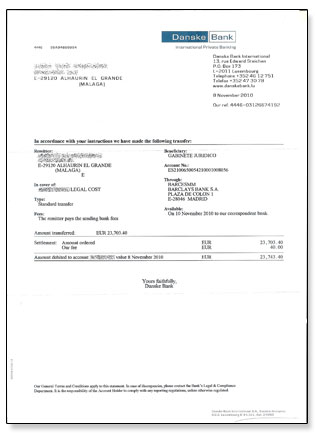By the Skin of the Teeth: Property Auction Instigated by Danske Bank Halted
 My client has had a narrow escape: having been notified in early March by the courts that his property was to be auctioned by Danske Bank, at 11:00h of the 8th of June 2011, we managed to obtain from the same court a ruling suspending the auction exactly…24 hours before (just like that one last call from the Alabama Governor…)
My client has had a narrow escape: having been notified in early March by the courts that his property was to be auctioned by Danske Bank, at 11:00h of the 8th of June 2011, we managed to obtain from the same court a ruling suspending the auction exactly…24 hours before (just like that one last call from the Alabama Governor…)
And prior to this, on the 27th of May 2011, that is, just a few days before the auction, we are advised, through the courts (Document in PDF), that, unbeknownst to him, my client did indeed have €126,946.64 with Danske Bank, in some account in Luxembourg, which is what he had been wiring to them, over the years, to attempt to placate them and avoid being kicked out of his retirement home bought with his life-savings. One can only imagine the topnotch service Danske bank provided my client once they had abandoned Spain, not before trying to repossess a few homes in its wake. Danske Bank had all but forgotten about this money until the very end, and they have the cheek to say that the debtor had paid up this sum when, as a matter of fact, it had been blocked for years.
So if it was not enough stress, we added that extra bit to it by, unwillingly, choosing the latest of the possible dates (other than tomorrow) to set aside the sale at public auction instigated by Danske Bank against a 73 year-old retired mariner victim of an equity-release, who had been conned into believing that, by going with the biggest Bank in Denmark and contracting what is effectively a tax-evading financial product on his unencumbered retirement home, he would have a monthly payment coming his way, pretty much all the inheritance tax his daughters would be hit with waived or wiped out and all of it, without risking anything (apart from his home, his health and, potentially, his two beautiful daughters’ freedom, as they would have been eligible for prison sentences to be served at Alhaurin prison, 10 minutes’ drive from the foreclosed home, had they followed Danske Bank’s careful tax planning).
The Judge had no choice but to suspend the auction as, alongside these foreclosure proceedings claiming approximately €845,000 (which is what Danske Bank’s clever and optimized investing has lost, or rather, in my opinion, allegedly misappropriated), a criminal complaint had been lodged in Mijas against CEO Peter Staarup and his sales guys once based on the Costa del Sol, including an unregulated IFA hired by the bank.
These are some the promises made by Danske Bank on its prospectus:
- Exempt from Spanish Inheritance Tax : if the beneficiaries, on the death of the insured, are not residents in Spain, the capital will not be liable to Spanish inheritance tax.
- Investment Strategy: CAUTIOUS
If this is what the HMRC thinks about tax-avoidance schemes, what would they say about the Danske Bank Tax-Evasion Capital Assurance product?
Documents
- 21-03-2011 – Danske Bank Equity Release Lawbird Client Case – Auction Notice (PDF – 70Kb)
- 07-06-2011 – Danske Bank Equity Release Lawbird Client Case – Auction Judge Suspension Order (PDF – 72Kb)


 The clients thought they’d be soon grinning from ear to ear once their application was approved, but the lenders knew that this ability to grin could be quickly challenged by grimace…
The clients thought they’d be soon grinning from ear to ear once their application was approved, but the lenders knew that this ability to grin could be quickly challenged by grimace…

 Surfing the web in search for information on the so-called equity-release fiascos, I came accross a very interesting article in respect of
Surfing the web in search for information on the so-called equity-release fiascos, I came accross a very interesting article in respect of